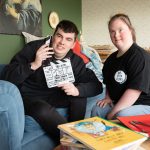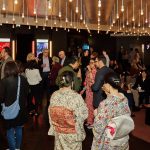A galaxy of stars will be taking part in Adelaide Writers’ Week this March, with its 2025 theme being Words Matter.
Kara Swisher, Tim Winton, Anita Heiss, Sir Simon Schama, Howard Jacobson, Rachel Kushner, Niall Williams, Stan Grant, Geraldine Brooks, Peter Beinart, Helen Garner, Orlando Figes, Bettany Hughes , Charlotte Mendelson, Wesley Lowery, Rachel Perkins, Robert Dessaix, David Remnick and Geoffrey Robertson, amongst a host of others, have managed to snag a spot at the best literary shindig in the southern hemisphere.
The director, Louise Adler AM, has also announced that she will continue in post for another year to deliver AWW 2026. Adelaide Festival Chair Tracey Whiting said, “I am delighted that Louise Adler AM will curate her fourth Adelaide Writers’ Week program in 2026. A celebrated figure in the literary world, Louise’s expertise, insight, and exceptional curatorial instinct have been instrumental in elevating Adelaide Writers’ Week to new heights. Under her guidance, the event has grown in prestige, attracting renowned international authors and providing both established and emerging Australian writers a valuable platform to share their work with the ever-growing audience that attends and celebrates this beloved event.”
Widely recognised as one of the most significant figures in Australian publishing, Louise has led a variety of organisations at management and board levels over the past 30 years, including 17 years as CEO and Publisher-in-Chief of Melbourne University Publishing, Editor-at-Large of Hatchette Publishing, and six years as President of the Australian Publishers Association. She has also overseen numerous awards both at home and overseas.
And so all that was left to do was her Irresistible interview. We caught up with her about the program she’s put together, how she got her start in publishing, and what she really thinks about writers book cover requests.

Can you give us your highlights for Adelaide Writer’s Week 2025
Love to. There’s The Great Debate, with Annabel Crabb and David Marr, so you can just imagine how much fun that will be. The title is True Friends Stab You in the Front, from the Oscar Wilde quote. I think that’s true. So, I can’t wait to see how that plays out.
The following night we have The Book Nerds Quiz of Quizzes with Julia Zemiro, who will be the Quiz Mistress. Of course, plenty of us who go to literary festivals and read books think we know everything, me included, so we’ll see what happens. I think I might know less than I think I do!
Tim Winton will speak about his latest book Juice, which is about climate change and the future. He’s always been a huge advocate in that space and it’ll be great to hear from him.


We’re looking at the issue of social cohesion, and racism and identity. I’ve asked Waleed Aly and his wife Dr Susan Carland to talk in a large town hall event about Islamophobia. Sir Simon Schama will speak that evening about antisemitism. In the gardens the following week, we’ll have Rachel Perkins, one of Australia’s most significant storytellers in conversation with Wesley Lowery, who wrote a book about racism in America, American Whitelash: The Resurgence of Racial Violence in Our Time. It’s also an opportunity to unpack Australian culture, what happened to The Voice, and where do First Nations peoples go from here.
The remarkable character Gina Chick will be joining us. She won the Alone Australia TV program, and she has written a book about her own life, We Are the Stars. I think people are amazed by her own story. I was completely hooked by the TV show, which is unusual for me.


The immensely popular Helen Garner has written a book about her grandson and football, The Season, which is wonderful, and Michelle de Kretser has a new novel out, which I think is brilliant, called Theory & Practice.
Niall Williams is a beautiful, very successful bestselling Irish writer. He will be here with his wife Christine Breen. They wrote a series of books together about making an Irish garden, so alongside Niall’s fiction, we’ll also be having conversations with the couple about what is means to write about their garden.


Julia Baird will be here, and in conversation with the remarkable Hanif Kureshi, who has had such a catastrophic accident which has left him a tetraplegic. Julia will also be in conversation with Michelle Johnson. Michelle is a doctor that has written a book about the traumatised and broken body.
It’s 10 years since The Book Thief was published and we’re having an anniversary event around that with Markus Zusak, which I’m thrilled about.
We will have a series, which we are doing in collaboration with the ABC and David Marr, called The State of the Self, The State of the Nation, The State of the World. We’ll try and get the big picture on what’s happening to us, what it means to be alive today and what are the key issues in our nation and the world at large.
So you’re staying to do another year at Adelaide Writers Week?
This is my third year at Adelaide, and I’ve been asked to stay on, so I will do another year. It’s the best job in the world. When I was first offered the role, I thought, ‘what a lovely job’. I don’t have to worry about sales, advances, writers not selling enough to cover their advances, the return on investment. I just have to invite writers I admire to Adelaide. It’s wonderful. Of course, you do have to be conscious of a very tight budget, and a lot of writers suddenly develop bad backs and need a business class flight, but we are asking people to come a long way.





Do you remember the first time you were in Adelaide for the festivals?
I lived in Melbourne as a child, and my first time was with my mother. She was very earnest about school. Being on time and studying hard, with shoes polished, and everything organised, was very much how she expected things to be. She took me out of school in Year 12 to go to the festivals. To this day, I still can’t believe she did it. She said, ‘We’re off to the Adelaide Festival.’ And that was it. I remember we were in a lift in Adelaide, and we bumped into Mikos Theodorakis, who was an absolute Greek heartthrob at the time. He was so glamorous and handsome. My mother was thrilled. I definitely remember her getting a bit of colour in her face!
I also remember that first time hearing the beat poet Alan Ginsberg, reading Howl in the Town Hall, and seeing Lawrence Ferlinghetti. These were groundbreaking poets and it was an amazing week.


It’s free. That’s its USP and has been since we started in 1960. It’s the unique quality which makes us highly inclusive and such a democratic experience. From 8am till 6pm in the Adelaide gardens, the festival is completely open to the public. There are some special evening events which are ticketed, but for over 130 sessions, featuring over 200 writers, people can come and go as they please. If someone fancies moving between the East and West stages to see what is going on, they can simply move, whether or not they’re dragging their highly valued (!) chairs and paraphernalia with them, and then, if they’re not sure about the West stage, they can head over to the North stage, and if they’re still not
You seem to get people that don’t show up at other festivals in Australia?
We do have the capacity to bring more international writers than other festivals, and we really focus on that; the blending of Australian and international writers. There’s a lot of support from our audience for Australian storytellers, but the chance to see the very best writers from overseas is a real drawcard. The writers themselves love the festival; they always tell us what a great time they had. We have a very strong reputation overseas.
In fact, we sit at an odd point in the publishing cycle year. Most books have been published pre– Christmas, so all of the promotion has happened by the time we are bringing people out to Adelaide. We’ve always been at the same time as Adelaide Festival and it won’t move. There are some writers who will always find it difficult to come, particularly if they teach, as so many writers do. But we aren’t completely thwarted by the publishing cycle
Is there something special about the audiences?
People are polite to each other, and the audiences are always highly engaged and ask excellent questions. I’ve seen lots of passion and debate, but it’s very civilised. Maybe that’s because it’s free and people think it’s a privilege, or that we’re lucky to have the festival. It might be something to do with Don Dunstan’s line about Adelaide being ‘The Athens of the South.” People who are very culturally plugged in come every year , it’s almost a badge of honour to be a regular. Because we are book people we want to encourage reading from cradle to grave, or just before that point! So we have a day devoted to younger readers too. We also have almost 50% interstate attendees. It’s just a perfect time to be in Adelaide, attending our program in the day, having a late afternoon drink, and then heading to an Adelaide Festival event in the evening. People plan their holidays around our festivals. There’s no other place in Australia where a major international performing arts and literary festival are on at the same time.

The whole program is delivered by a team of two, believe it or not!
Which other festivals around the world do you think are getting it right?
I think the work that the Palestine Festival of Literature does, which is held in the U.S., is very important. It is denigrated and vilified, but it gives voice and space to Palestinian writers who otherwise don’t find an outlet. I think all festivals are driven by the latest books being published, but that means it is exciting for the audience because they are seeing a writer whose latest book is fresh. Jaipur Literary Festival brings together a tremendous range and diversity. They have a much larger budget, but they deliver a very impressive programme.
You’ve had a huge career in publishing. How did you get started?
I completely fell into it. I was a bookish person as a child. I had asthma, and spent a lot of time in bed reading novels. When I was in my twenties, I was having an incredibly exiting time living in New York and doing my PhD at Columbia University. I was embedded in this really thrilling postgraduate environment, and I just happened to be at Colombia when there were the most outstanding teachers there, people like Edward Said. I was in heaven. I’d been away for eight years and decided to I came back to Australia and began working as a tutor in the English department at Melbourne University. Morning tea with colleagues was all about the cricket. It felt very sober and quiet compared to where I’d been, and I discovered that I didn’t really yearn to be an academic. A job came up at Australian Book Review. I hadn’t been immersed in Australian literary culture because I had been away during the renaissance of Australian arts and culture. But when you are young you have the confidence to think that being ignorant or underprepared is no impediment! I did tell the selection panel that I’d never edited a book or a magazine, but I thought I could bring people and ideas together. I didn’t know it yet, but that turned out to be my one skill!
After a while, Sandy Grant, who led Hardie Grant Publishing, tapped me on the shoulder to go and work with him at Reed Books Australia, which was an international consumer book business. He saw what I’d done over nine issues at Australian Book Review, and he told me, ‘You’re a publisher.’ And that’s how it all started.


I was always very committed to serious literary fiction and non–fiction. But I did edit April Fool’s Day for Bryce Courtenay and learned a lot along the way. But my publishing interests tended to the more serious end of the market, as in books that sell less than mass market books !
Are there any books that you are most proud of from over the years?
There are two controversial books that I’m proud of. One was The Latham Diaries, which had a huge impact and was very successful. Making that book happen was such an interesting experience, and the engagement with Mark Latham was fascinating. I would write about it but the defamation laws will have to change first!
Was there a lot of management of writers egos?
Authors names are usually prominent, and I would think to myself, ‘Really? I don’t know how you picked up the phone to make that call.’ It was funny.


To design a book’s cover is such a challenging process . Sometimes the first cover the designer sends through is brilliant, sometimes the design magic just never quite happens. We always spend a lot of energy on the blurbs on the back. I don’t think they are read as much as people in the
industry think. It’s the cover and the name that people are attracted to. Designing–by–committee, like editing–by–committee, is a disaster. In my experience, the more you muck around with the designer’s first instincts, the more you lose something, Everybody in the publishing team has a stake in the book, which is great, but it also means that everyone has an opinion about the book cover, which can get complicated.
Any other significant career learning moments you would care to share?
I always say I learnt a lot from the mistakes I made. I made two big ones that always stick in my mind. The first one was when I was the presenter on the live arts program Arts Today on Radio National. I was there for three years. Sometimes we would do a pre– record, and whether it was live or recorded, as a presenter I was given briefs by producers. A particular musician came in, and I hadn’t made the time to listen to his music. He sat down, I asked a question, and he said, ‘You don’t know anything about my music, do you?’ I was so embarrassed. He walked out and refused to do the interview. It was such an important lesson. Other people have done the work, you have to match it. Maybe some people can wing it , but I can’t .
My other mistake I come back to was in the early nineties and I was working at Reed. Steve Price was running 3AW, and invited me to do the drive program for three weeks. I’d never done any radio before in my life. It was the footy tipping season, and on this particular day it was 5pm on a Friday afternoon. Max Walker, Rex Hunt, John ‘Dr Turf’ Rothfield were crammed into the studio with me and the producer was sending us information on a screen. During the segment about tipping for the games that weekend, I was trying to play my part as a footy tragic, actually I had no idea what was going on. To be fair there was a lot of testosterone in the studio, however that’s really no excuse. I tried to say casually ‘What’s going to happen at Gardenia Park.’ I discovered later that the Geelong Football club home base is Kardinia Park. All these guys started laughing, they thought I was making a joke about the masculinity, or lack of it, of the Geelong team. I thought the producer had written it wrong on the screen, and of course, the problem was actually I didn’t know anything about football. Which bring us back to the key lesson: don’t fake it, do your homework and know what you don’t know!



There are good arts management courses around, which will give people a solid grounding in the practice of working in this space. People often say to me, ‘I love books.’ That’s not enough to get you a job in publishing, or the arts more generally. It really helps to have the broad understanding that you get from a practical publishing degree, the more practical the better. You can learn on the job and we have had some work experience people who turn out to be really good, but that’s not the standard pathway these days. I would recommend people interested in a career in publishing do their homework: really study the publisher’s website, understand what books they do and don’t publish and spend time in bookshops.
What about tips for authors?
For writers, first of all publish anywhere you can. The small literary magazines. Anywhere. An agent probably isn’t going to take someone on who hasn’t been published in a variety of places. Enter writing competitions, write reviews for newspapers. All of that builds up a profile and a portfolio. I think writers need to know who their audience is as well. Sometimes writers think their work is going to hit different groups of people – that Uncle Kev will be rivetted by your gripping narrative AND policy wonks will immediately be influenced by your analysis. It’s not usually like that. Writers need to be tough with themselves, and clear about who is going to appreciate their work.

ADELAIDE WRITERS’ WEEK 2025
Pioneer Women’s Memorial Garden, King William Road, Adelaide
Saturday 1 – Thursday 6 March
FREE
Adelaide Writers’ Week by numbers:
- 6 days
- 231 writers, 37 Internationals live and livestreamed
- 140 free sessions and 11 ticketed events.
- 8 podfest sessions
Adelaide Writers’ Week has been made possible by the generous support of The University of Adelaide, The Advertiser/Sunday Mail, The Office of Ageing Well and Seniors Card and philanthropic support of The Literati and MUD Literary Club.
All program and booking details are online at https://www.adelaidefestival.com.au/writers-week/ from 9am (ACDT) on Wednesday 29 January.
Schools Day
Friday 28 February, 10am – 12:30pm (Primary Schools) and 10am – 2:30pm (Secondary Schools)
Young Readers’ and YA Day
Sunday 2 March, 9.30am – 4pm










